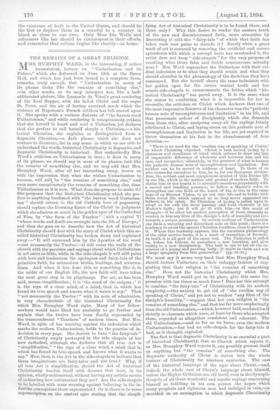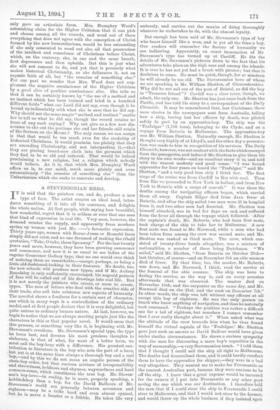THE REMAINS OF A GRE A.T RELIGION.
MRS. HUMPHRY WARD, in the interesting, if rather inconsistent, lecture on "Unitarianism and its Future," which she delivered on Jane 19th at the Essex Hall, and which. has just been issued in a complete form, remarks, truly enough, that "Unitarianism in many of its phases looks like the remains of something else," —in other words, as we may interpret her, like a half. obliterated picture, like Leonardo da Vinci's great rendering of the Last Supper, with the faded Christ and the eager St. Peter, and the air of having survived much which the violence of Napoleon's French soldiers has left scored upon it. She speaks with a curious distaste of "the barren word Unitarianism," and while rendering it conspicuously evident that she herself is heart and soul a Unitarian, yet declares that she prefers to call herself simply a Christian,—a his- torical Christian, she explains, as distinguished from a dogmatic Christian,—a dark phrase which she does not venture to illustrate, for in any sense in which we are able to understand the words, historical Christianity is dogmatic, and dogmatic Christianity is historical. But undoubtedly Mrs. Ward's criticism on Unitarianism is true ; it does in many of its phases, we should say in most of its phases, look like the remains of something else, and we may add that Mrs. Humphry Ward, after all her interesting essay, leaves us with the impression that what she wishes Unitarianism to become, will still. be "the remains of something else," and even more conspicuously the remains of something else, than Unitarianism as it is now. What does she propose to make it? She proposes that the historical Christianity which she pre- fers to anything burdened with "the barren word Unitarian- ism" should return to the old Catholic love of pageantry, should replace the frowning figure of the Christ in judgment which she admires so much in the golden apse of the Cathedral of Pisa, by "the form of the Teacher" [With a capital T] "whose words and death are wrought into the life of Europe;" and then she goes on to describe how the Art of historical Christianity should deal with the story of Christ which this so- called historical Christianity has broken down and explained away :—" It will surround him by the Apostles of his word —not necessarily the Twelve !—it will cover the walls of the church with the parables and sayings about which Catholicism in art cares so little, while in the side-chapels it will still paint with love and tenderness the apologues and fairy-tale of the primitive faith, its miraculous births, healings, and resurrec- tions. And when it has done this, or something like it, in the midst of our English life, the new faith will have taken the next great step in its pilgrimage. For art, as has been said, means simplification ; it is 'the word of the enigma ; ' it is the sign of a clear mind, of a mind, that is, which has found its true speech and knows what it wants to say." That "not necessarily the Twelve!" with its note of admiration, is very characteristic of the historical Christianity for which Mrs. Humphry Ward sighs. Many of her fellow- workers would have liked her probably to go further and explain that the twelve have been finally superseded by the transcendental " Teachers " of modern times. But Mrs. Ward, in spite of her warning against the indecision which marks the modern Unitarianism, holds to the practice of in- decision in every page. She desires to have "the fairy-tale" of Christianity amply portrayed in the side chapels of her new cathedral, although she declares that all true Art is "simplification," "the sign of a clear mind, a mind that is, which has found its true speech and knows what it wants to say." How, then, is the Art in the side-chapels to indicate that these imaginations are fairy-tales and not true? Why, if all true Art is simplification, should the Art of historical Christianity burden itself with dreams that were, in its opinion, wholly unhistorical, without having any artistic means of indicating how unhistorical they are? Are the side-chapels to be labelled with some warning against believing in the in- fantine conceptions there represented ? Or is there to be some superscription on the central apse stating that the simpli- fying Art of historical Christianity is to be found there, and there only ? Why this desire to render the austere truth of the new and disembarrassed faith, more attractive by decorating it with the " fairy-tale " of which that faith has taken such vast pains to denude it ? Sorely when a great work of art is restored by removing the artificial and rococo splendours with which a corrupt taste has overloaded it, the artist does not keep " side-chapels " for the very purpose of recalling what those false and feeble ornatenesses actually were P Mrs. Ward reproaches the Unitarians with their evi- dent indecision as to what they should retain and what they should abandon in the phraseology of the doctrines they have renounced. But she herself shows the same indecision with her golden apse for the severe central truth and her ornate side-chapels to commemorate the fables which " his- torical Christianity" has pared away. It is the same when she comes to combining, what it is impossible for her to reconcile, the criticism on Christ which declares that one of the most impressive features of his character was the "pathetic human note of incompleteness and limitation" in his life, and that passionate ardour of discipleship which she demands from those who, after analysing away all the sayings falsely attributed to Christ, and laying stress on this pathetic note of incompleteness and limitation in his life, are yet required to throw themselves at his feet in the abandonment of true devotion :— "There is no need for the 'swollen way of speaking of Christ,' to which Charming objected. Christ is best served to-day by a plainness and steadiness of mind which refuses to draw any lino of impassable difference of whatever sort between him and his race, and recognises. ultimately, in the greatest of what is human the pathetic human note of incompleteness and limitation. But neither can he be served in coldness of heart. To those of us who surrender oureelvee to him, he is, for our European civilisa- tion, the noblest and most conspicuous symbol of that Divine life in our life, which is the matter and ground of modern faith. To shrine him in our hearts is to associate ourselves perpetually with a sacred and kindling presence, to follow a Master's voice, to strengthen our own faith at the touch of his, to live in the same hope of an Eternal Vision, to go out into life and to battle with those social ills which oppress us as they never oppressed our fathers, in his spirit. No Christian of to-day is called upon to adopt as his own the mere passing and local elements of his Master's faith ; but it will go" ill with him—in this world of struggle—if he allow his modern perception of those elements to weaken in him any fibre of the disciple's debt of humility and love towards a unique greatness. In certain sections of Unitarianism one finds a wavering and discordant note on this point ; there is a tendency to avoid the special Christian tradition, even to patronise it. Where this tendency appears, like the uncertain phraseology of the older service-books, it is a mark of transition, of ferment. In truth it is all part of the same test. The Unitarian is called on, before his fellows, to assimilate a new learning, and give reality to a new discipleship. The task is one to tax all the re- sources of a young and growing body ; it ought to claim and win a large sympathy from this generation." (pp. 88-70.) We must say it seems very hard that Mrs. Humphry Ward should lecture Unitarians on their unhappy fashion of sug- gesting that their religion is "the remains of something else," Does not the historical Christianity which Mrs. Humphry Ward would put in its place, give this same im- pression with ten times as much force P Does not this attempt to combine "the fairy-tale" of Christianity with its austere simplicity,—this anxiety to get rid of "the swollen way of speaking of Christ," and yet not to weaken "any fibre of the disciple's humility,"—suggest that her own religion is "the remains of something else," and that too far more emphatically than the old Unitarianism,—which, however bald, confined itself strictly to elements which were, at least by those who accepted them, regarded as altogether consistent and coherent. The old Unitarianism,—and so far as we know, even the modern ITnitarianism,—has had no side-chapels for the fairy-tale it had, as it thought, exploded.
The fact is that dogmatic Christianity is so essential a part of historical Christianity, that no Church which rejects it, as Mrs. Humphry Ward rejects it, can possibly present itself as anything but "the remains of something else. The dogmatic authority of Christ is woven into the whole texture of Christianity for nineteen centuries. The cast of the historical language of the ages about Christ,—and, indeed, the whole cast of Christ's language about himself, unless the Higher Criticism can rid itself, even in the Synoptic Gospels, of all those wonderful and mystic sayings concerning himself as fulfilling in his own person the hopes which many prophets and righteous men had indulged in vain,—is moulded. on an assumption to which dogmatic Christianity only gave an articulate form. Mrs. Humphry Ward's astonishing claim for the Higher Criticism that it can pick and choose among all the records, and weed out of them everything that does not agree with the conception of Christ formed by the new humanitarians, would be less astounding if she only consented to weed out also all that prostration of the intellect and conscience of Christians before Christ, which, on the contrary, she, in one and the same breath, first deprecates and then upholds. But this is just what she will not consent to do, and yet that is precisely what makes historical Christianity, as she delineates it, not an organic faith at all, but "the remains of something else." For our part we wonder that Mrs. Ward does not sup- plement the negative omniscience of the Higher Criticism by a good slice of positive omniscience also. She tells us that it can be certainly known by "the use of a method and an instinct which has been trained and tried in a hundred different fields" what our Lord did not say, even though it be bound up indissolubly with what she is sure that he did say. Why should not the same magic" method and instinct" enable her to tell us what he did say, though the record retains no trace of any such saying? Why not give us a few new dis- courses to eke out the portions she and her friends still retain of the Sermon on the Mount? The only reason we can assign is that that would be too much even for the credulity of historical Christians. It would proclaim too plainly that they are amending Christianity, and not interpreting it,—that they are piecing brand-new cloth into the garment which they find to be so old and tattered. That would be indeed proclaiming a new religion, but a religion which nobody would believe. As it is, that which Mrs. Hunaphry Ward offers us is, to our mind, much more plainly and even ostentatiously "the remains of something else" than the Unitarianism which she seeks to renovate and develop.



































 Previous page
Previous page